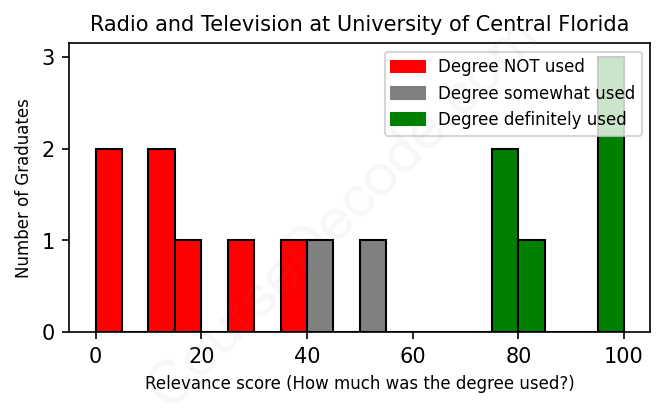
First, some facts. Of the Radio and Television graduates from University of Central Florida we've analyzed , here's how many have used (or NOT used) their degree in their career:

These are estimates based on AI analysis of 15 LinkedIn profiles (see below).
The verdict? Significantly below average. Overall, with an average relevance score of 48%, Radio and Television graduates from University of Central Florida have a much lower likelihood (-19%) of finding work in this field compared to the average graduate across all fields:
And for comparison, here's the chart for all profiles we've looked at across all degrees.
Also, after graduating, only 13% of these graduates have pursued further education other than another Bachelor's degree (such as a Masters degree or other), compared to the average across all profiles of 35%. This suggests a Bachelors degree is enough for most Radio and Television graduates, and it's normal to look for work straight after graduation.
See the details:
|
Relevance score: 2% We think this person has NOT gone into a career related to their degree. We think this person has NOT gone into a career related to their degree.
DEGREE INFOGraduated in 2011 from University of Central Florida with a Bachelors in Radio and Television. No other secondary education since. JOB HISTORY SINCE GRADUATIONPromotions Intern Cox Media Group Jan 2011 - Apr 2011 Team Lead  24-7 InTouch Contact Center, LLC Mar 2015 - Oct 2018 Customer Service Representative  Spectrum May 2019 - Present ABOUTExperienced Team Lead with a demonstrated history of working in the broadcast media industry. Skilled in Twitter, Microsoft Word, Audio Editing, Google Drive, and Time Management. Strong information technology professional with a Bachelors focused in Radio and Television from University of Central Florida. |
The top 10 most common jobs done by the graduates we've analyzed (ranked most common to least) are:
Looking at the job trajectories of graduates from the University of Central Florida with degrees in Radio and Television, it’s clear that many have found their way into roles that directly relate to their studies. The most common positions include various types of news reporters and anchors, particularly at established media outlets like Univision and NBCUniversal. These roles often require skills in communication, broadcasting, and production—everything a Radio and Television program aims to teach. It's a solid path, showing that these graduates tend to land jobs that keep them close to their original field of study.
However, not all jobs align perfectly with the degree's focus. Some graduates end up in customer service roles or unrelated positions like account management, where the direct application of their Radio and Television skills is minimal. Even though skills like communication can be broadly useful, many of these positions don’t require specific knowledge from the program. Overall, it seems that while many graduates do find relevant work in media, there’s also a fair number who drift into different areas that don’t quite match their studies. So, if you’re thinking about a degree in this field, it's good to know that you may end up with a job you love— just be aware of the variety in your options!
Here is a visual representation of the most common words in job titles for Radio and Television graduates (this is across all Radio and Television graduates we've analyzed, not just those who went to University of Central Florida):

Looking at the career paths of graduates from the University of Central Florida who studied Radio and Television, there seems to be quite a mix of trajectories. For many of the early graduates, particularly those from around 2011 to 2016, it appears that their first jobs often started with internships or entry-level positions in media companies. Many initially took on roles like promotions assistants, reporting interns, or entry-level news reporters, which makes sense given their degree focus. Over the years, those who stayed in the media sphere progressed into more prominent positions. For instance, some found success as news anchors and investigative reporters at respected organizations like Univision and NBCUniversal. This suggests that if you stick with it, landing a good job in the industry is totally doable.
However, it's also clear that not everyone stuck with radio and television. Several graduates shifted to jobs that don't seem directly related, like customer service representatives or project managers in other industries. For those who graduated more recently, like in 2018 and beyond, we see some taking on roles in areas like communications and digital marketing, department management with companies like Williams-Sonoma, or even working as sales associates. While it’s awesome that some people found roles that fit their skills, it also shows a potential trend where graduates might not stay within the media industry long-term. Overall, UCF alumni have diverse career outcomes; some have certainly thrived in media-related careers, while others have taken their skills to different fields, which somewhat dilutes the “successful career path” narrative. It really depends on the individual and their career choices post-graduation.
Getting a Bachelor's degree in Radio and Television, like the one at UCF, can be a pretty manageable experience, especially if you're into media and storytelling. The program usually mixes practical hands-on work with some theoretical classes, so you get to work on projects and learn stuff that genuinely interests you. While it can be challenging at times—especially with deadlines for projects and balancing classes—it's generally not considered one of those super grueling degrees. If you keep up with your assignments and engage in the creative aspects, you should find it to be a rewarding and relatively accessible choice.
Most commonly, in the LinkedIn profiles we've looked at, it takes people 4 years to finish a Bachelor degree in Radio and Television.
Looking at the career paths of these Radio and Television graduates from UCF, it seems like some have done pretty well financially, while others are still finding their footing. For instance, those who moved into roles like News Anchor or Communications Specialist at big organizations like Univision and the Orlando Magic likely earn decent salaries, probably on the higher end of the spectrum for grads in this field. However, there are also others who have taken roles like Customer Service Representative or various internships, which typically don’t pay as well, especially at the start. It’s clear that with time and experience, many of them are climbing the ladder and likely making better money now, but for some, the journey might still be a bit of a struggle financially. Overall, it looks like there’s potential to earn well in these fields, but it's definitely a mixed bag just starting out.
Here is a visual representation of the most common words seen in the "about" section of LinkedIn profiles who have a Bachelor degree in Radio and Television (this is across all Radio and Television graduates we've analyzed, not just those who went to University of Central Florida). This may or may not be useful:

Here are all colleges offering a Bachelor degree in Radio and Television (ordered by the average relevance score of their Radio and Television graduates, best to worst) where we have analyzed at least 10 of their graduates:
| College | Score | Count |
|---|---|---|
 University of Central Florida University of Central Florida
|
48 | 15 |